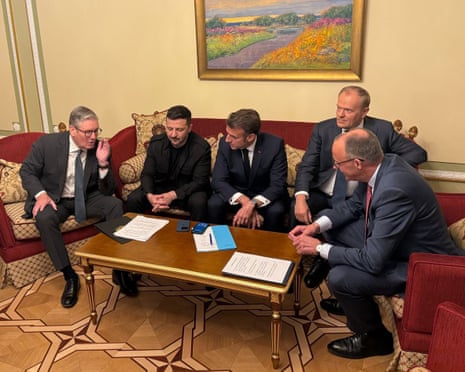
Wafric News – May 10, 2025
Leaders warn of "massive" sanctions as Kremlin resists pressure to halt war unconditionally.
In a united diplomatic front, European leaders are pushing Russia to accept an unconditional 30-day ceasefire in Ukraine, set to begin on Monday. The appeal came during a high-profile summit of the so-called "coalition of the willing" in Kyiv, attended in person by the leaders of France, Germany, the UK, and Poland, and supported remotely by several other global allies.
The ceasefire initiative, originally proposed by US President Donald Trump, was discussed in a joint call between the European leaders and the White House. Following that discussion, a warning was issued to Moscow: failure to comply could trigger a new wave of "massive" coordinated sanctions from both Europe and the United States.
British Prime Minister Sir Keir Starmer stressed that the coalition's message was clear: "Aggression will never prevail on our continent." He said achieving a ceasefire would be a major step toward "reviving Ukraine’s economy, restoring investor confidence, and reuniting families torn apart by war."
Standing alongside Ukrainian President Volodymyr Zelensky, French President Emmanuel Macron, Polish PM Donald Tusk, and German Chancellor Friedrich Merz, Starmer emphasized the shared commitment to ending the war and rebuilding Ukraine’s future.

Zelensky reiterated the call for an unconditional ceasefire, pushing back against Russia’s demand that military aid to Ukraine be halted before any truce. “Any conditions placed on a ceasefire are simply tactics to prolong the war and sabotage diplomacy,” Zelensky said.
Macron confirmed that the proposed truce would be primarily monitored by the United States, with support from European countries. In case of violations, he said, “a coordinated sanctions response is already prepared.”
Germany's Chancellor Merz called the ongoing war a "blatant violation of international law," reaffirming that the conflict was entirely initiated by Russia.
The Kyiv summit was seen as a symbolic counterpoint to Russian President Vladimir Putin’s meeting in Moscow a day earlier, which gathered over 20 allied leaders. Leaders participating remotely in the Kyiv meeting included Italy's Giorgia Meloni, Canada's Mark Carney, European Commission President Ursula von der Leyen, and NATO Secretary-General Mark Rutte.
The diplomatic push comes on the heels of a 30-hour ceasefire called by Putin to mark Russia’s Victory Day, which was set to expire Saturday. Although the brief pause led to a temporary reduction in hostilities, both sides reported multiple breaches.
Despite claims of a temporary halt in fighting, Russian attacks across Ukraine continue, with tragic consequences. In Sumy, an 85-year-old woman was killed and three others wounded; nearly 30 homes and buildings were destroyed or damaged, police reported. In Kostyantynivka, eastern Donetsk, a strike sparked fires in residential buildings. Meanwhile, in Kherson, a 58-year-old civilian was injured in a drone attack.
Trump, reaffirming his stance after a phone call with Zelensky, emphasized that any breach of the ceasefire would result in tougher sanctions: “If the ceasefire is not respected, the US and its partners will act decisively,” he posted on social media.
The Kremlin, however, has dismissed the initiative. Spokesman Dmitry Peskov accused European leaders of issuing confrontational and inconsistent statements. “We need time to assess this proposal, but pressure on Russia is pointless,” he said, according to Russian state media.
As Russia weighs its next move, the international community waits to see whether diplomacy can halt one of Europe’s most devastating conflicts in decades — or if the war will grind on despite mounting global pressure.
By WafricNews Desk.
By WafricNews Desk.


Comment
To post a comment, you have to login first
LoginNo Comments Yet...